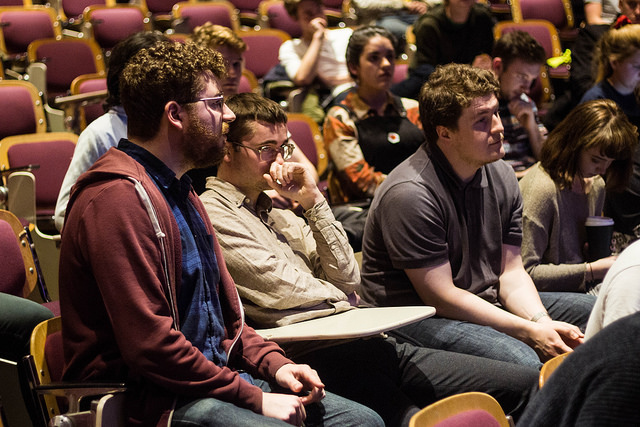The Graduate Students Union (GSU) has traditionally operated comfortably below the radar, avoiding quite happily the circus and ceremony that surrounds the goings on of the Trinity College Dublin Students’ Union (TCDSU). This year, however, the announcement that postgraduate fees were being increased by five per cent threw the GSU into the glare of spotlight, as incumbent President Shane Collins grappled with the issue.
This year’s sole presidential candidate Oisín Vince Coulter, is no stranger to student politics. In an interview with The University Times, Coulter admitted to having spent “far too long” in Trinity. Over the course of his six years on campus, he was involved in Lynn Ruane’s presidential campaign in 2015 and was a founding member of the Students Against Fees campaign group. The uncontested candidate has also served as Treasurer for the Publications Committee, Editor of Trinity News and is currently Chair of the GSU.
Coulter appears aware of, but unfazed by the fact that few postgraduate students will have engaged with their union and college life to the extent that he has. “Even though they might not be as involved, the way you’d have large numbers of hacks in the SU, I feel like if there is a campaign that connects with the issues they deal with in their day to day life, those people will want to be involved in that.”
As workers, your greatest power is your capacity to withdraw your labour
Certainly, Trinity’s postgraduate students have an array of issues with which to deal. Coulter called addressing the “wide disparity in terms of paying conditions” enjoyed by postgraduate workers as “a core part of my campaign and my presidency if I am elected”. Tackling the inconsistency between conditions granted to teaching assistants across various departments and “bringing in better academics, more contact hours and more classes” are high on Coulter’s ambitious agenda. But it is clear that opposing further increases on postgraduate fees is this candidate’s top priority.
Stating his belief that postgraduate students are being treated as “cash cows”, Coulter said that the possibility of striking is one he would have no qualms about pursuing. “I don’t think it’s a drastic measure. I think it’s still on the table this year and will definitely be on the table next year if I was President.”
Though he acknowledged that “you’re not going to be able to force anyone [to strike], there are difficulties around that”, Coulter stated that if this action was supported by a majority of the GSU, “it would be binding on the graduate student body as a whole. If pickets are put outside of College, I would hope that no students, undergraduate or postgraduate, would cross that picket line”.
Coulter believes such measures are warranted, given College’s justifications for the fee increases. Though the five per cent hike was introduced as a means of raising €2.5 million in the face of continued government cuts to higher education, the presidential candidate believes that “College have given up on state funding. The Provost himself has indicated his openness to increasing third-level fees, to loan schemes, so I guess I don’t really take them at their word”.
One extra student on a committee that us already dominated by various apparatchiks appointed by the Provost who are always going to vote against students interests will not make much of a difference
“As workers, your greatest power is your capacity to withdraw your labour. The entire College system is relying on postgrads to ensure that it continues to work”, Coulter stated. “If they decide that they’re no longer willing to do that work, I think that’s a very powerful tool”.
Striking is not the only mechanism Coulter intends to utilise to affect change, if he is successfully elected. “There will be a large range of options on the table. Protests, possible occupations, sit-ins, gathering signatures, lobbying”. In order to ensure that the postgraduate community is protected, he’s insistent that “any of the activist tools in the toolbox are on the table”.
It is clear that Coulter is extremely passionate about the plight of the postgraduate student. Though he thinks it “disgraceful” that the GSU President can sit in attendance at Finance Committee meetings but cannot vote, addressing this will not be a priority should his presidential bid be successful. “One extra student on a committee that us already dominated by various apparatchiks appointed by the Provost who are always going to vote against students interests” will not make much of a difference, he feels.
Moreover, he expects solidarity from other College facilities when the Global Room funding the GSU currently receives runs out next year. “I would like to think that it’s only fair for the SU, DUCAC and the CSC to give up a share of their funding in order to make up the €30,000-ish we make from the Global Room”, he said.
Perhaps he is emboldened by being an uncontested candidate in this presidential race, or perhaps the slightly antagonistic tone of his campaign is merely reflective of the turmoil postgraduate students have faced for the last several years. Either way, Coulter’s ideas are daring, and his approach is jarringly at odds with the more diplomatic tact taken by the presidential candidates in the recent TCDSU elections. If his campaign is as combative as his presidency promises to be, this will be an interesting race to follow.
Jack Synnott and Aoife Kearins will be correspondents for the 2018 Graduate Students’ Union elections. Aisling Marren will edit coverage of the election.







